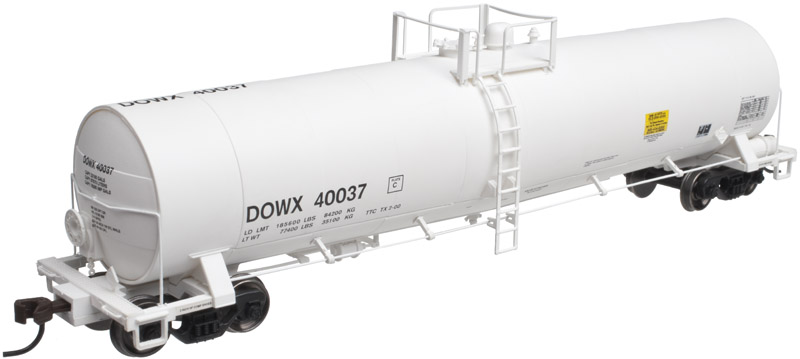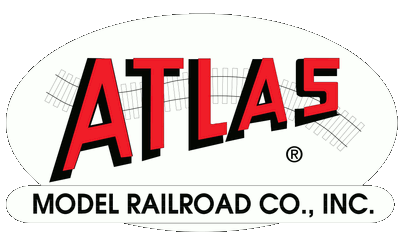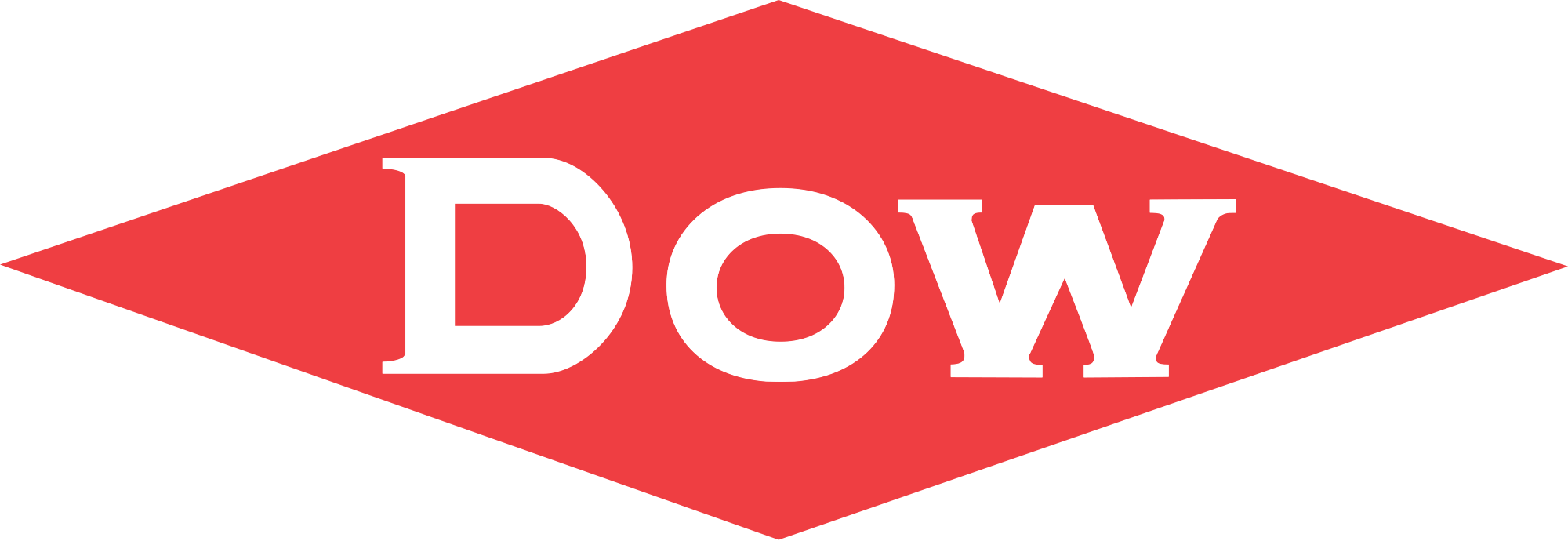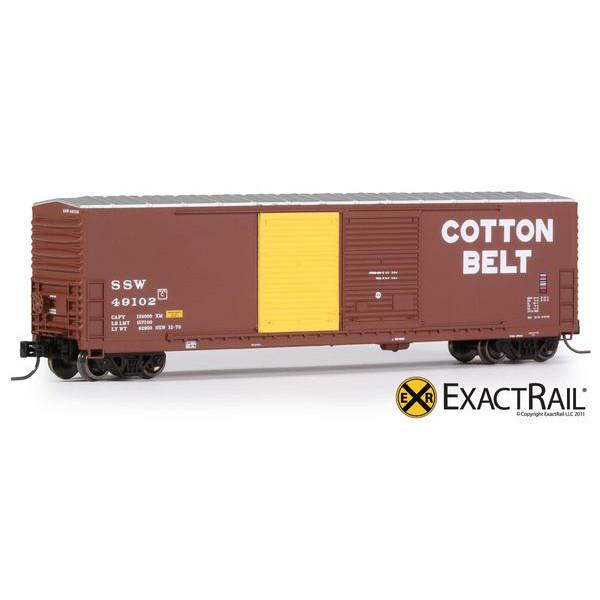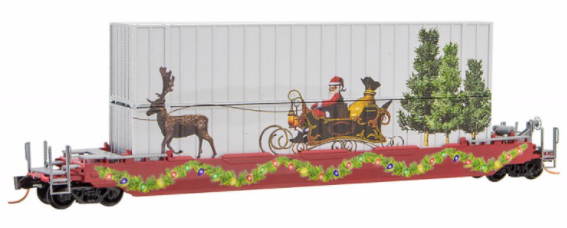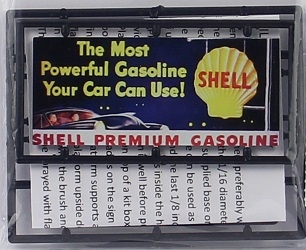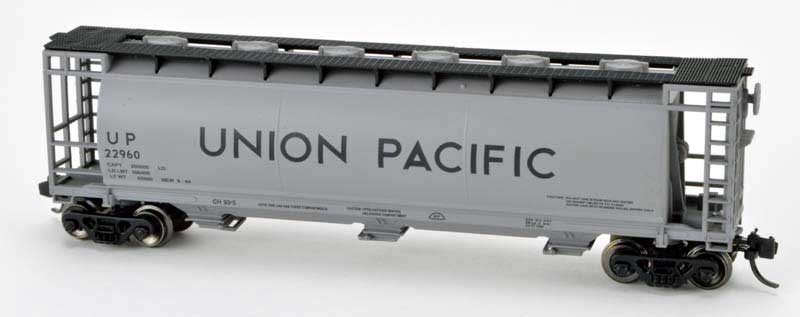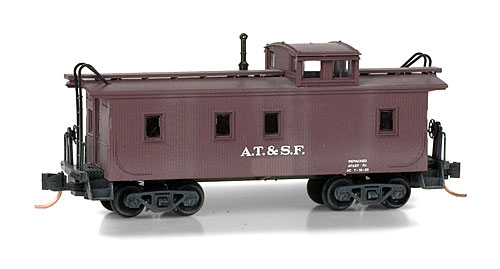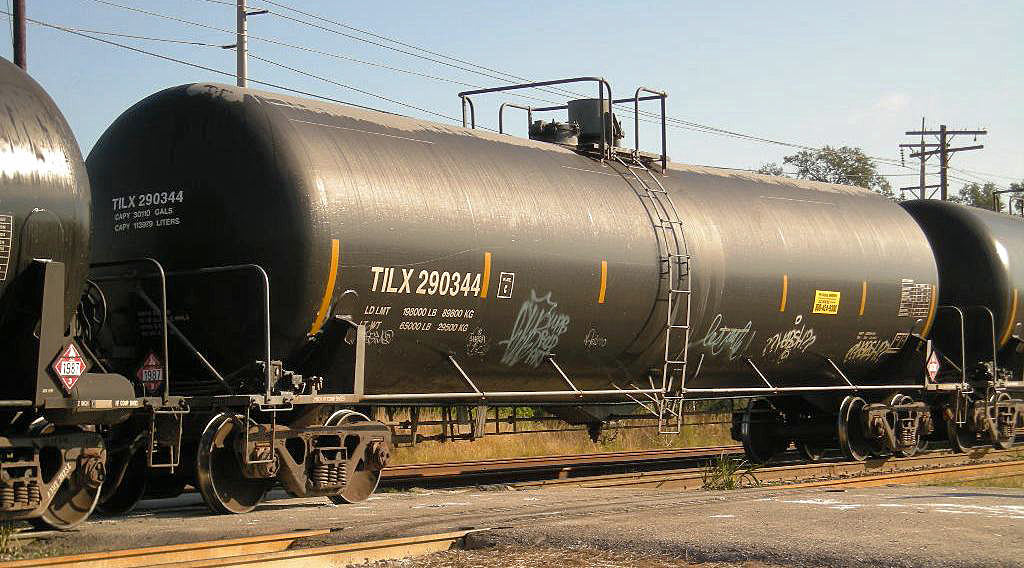Body Style Information: This is a model of an ACF® Industries built general-purpose, single-compartment, 23,500 gallon, insulated, coiled, non-pressurized tank car. Our model represents cars built from 1969 and still in service today. A wide variety of products can be transported in this size and type of tank car. This includes asphalt, ethanol, fuel oil, metal sodium, molten phenol, paraffin wax, tallow, urethane polyol, and vegetable oil.
Features: Separately molded brake line plumbing Ultra-thin handrails Tank fittings and safety placards 100-ton roller-bearing trucks Brake wheel chain detail Accurate painting and lettering Factory-installed AccuMate® magnetic knuckle couplers
Features: Separately molded brake line plumbing Ultra-thin handrails Tank fittings and safety placards 100-ton roller-bearing trucks Brake wheel chain detail Accurate painting and lettering Factory-installed AccuMate® magnetic knuckle couplers
Prototype Information: Larger 50+ foot yank cars replaced their smaller predecessors in the late 1960s and 1970s. One example is the class DOT 111 A100. This car is rated for non-pressurized use with a safe maximum operating pressure of 100 psi. Developments in materials and manufacturing allowed this tanker to be constructed without an underframe. The bottom of the tank itself serves as the load bearing structure. The primary difference between the various types of DOT 111 A100 class tank cars is internal with varying types of insulation, lining and even weld material. Cars of this type haul a wide variety of commodities such as gasoline, vegetable oils, corn syrup, fruit juice and weed killers.
Road/Company Information: The Dow Chemical Company (NYSE: DOW), commonly referred to as Dow, is a multinational chemical corporation headquartered in Midland, Michigan. Dow provides chemical, plastic, and agricultural products and services to consumer markets that include food, transportation, health and medicine, personal care and construction, and operates in approximately 180 countries.
As of 2014, Dow ranked third in chemical production (after BASF and Sinopec), and as of 2015, was the third largest chemical company in the world by revenue (after Sinopec and BASF). Dow was also the world's largest chlorine producer, with 5.7 billion tons a year of production before Dow's association with Olin was formed; was ranked as the world's largest plastics manufacturer during 2008, and the largest manufacturer of polyalkylene glycols in 2013.
Dow's principal lines of business include Agricultural Sciences, Consumer Solutions, Infrastructure Solutions, Performance Materials & Chemicals, and Performance Plastics. It employs approximately 53,000 people worldwide. Dow's 2014 sales totaled approximately $58.2 billion. Dow has been called the "chemical companies' chemical company" in that most of its sales are to other industries rather than end users, although Dow sells directly to end users primarily in the human and animal health, agriculture, and consumer products markets.
The company was founded in 1897 by Canadian-born chemist Herbert Henry Dow. After a period of diversification, it became a major chemical company, a significant player in the world market, and a part of the military-industrial war effort during both World Wars.
As of 2014, Dow ranked third in chemical production (after BASF and Sinopec), and as of 2015, was the third largest chemical company in the world by revenue (after Sinopec and BASF). Dow was also the world's largest chlorine producer, with 5.7 billion tons a year of production before Dow's association with Olin was formed; was ranked as the world's largest plastics manufacturer during 2008, and the largest manufacturer of polyalkylene glycols in 2013.
Dow's principal lines of business include Agricultural Sciences, Consumer Solutions, Infrastructure Solutions, Performance Materials & Chemicals, and Performance Plastics. It employs approximately 53,000 people worldwide. Dow's 2014 sales totaled approximately $58.2 billion. Dow has been called the "chemical companies' chemical company" in that most of its sales are to other industries rather than end users, although Dow sells directly to end users primarily in the human and animal health, agriculture, and consumer products markets.
The company was founded in 1897 by Canadian-born chemist Herbert Henry Dow. After a period of diversification, it became a major chemical company, a significant player in the world market, and a part of the military-industrial war effort during both World Wars.
Brand/Importer Information: In 1924 Stephan Schaffan, Sr. founded the Atlas Tool Company in Newark, New Jersey. In 1933 his son, Stephan Schaffan, Jr., came to work for his father at the age of sixteen. Steve Jr. built model airplanes as a hobby and frequented a local hobby shop. Being an enterprising young man, he would often ask the owner if there was anything he could do to earn some extra spending money. Tired of listening to his requests, the hobby-store owner threw some model railroad track parts his way and said, "Here, see if you can improve on this".
Atlas has made a ton of wonderful products throughout the years and we often get questions one whether we have run a certain road name on a particular model. It should be noted that Atlas locomotives and rolling stock are greatly appreciated for their superior operating and running characteristics. Atlas products are also well known for their outstanding collectability not only due to their superior prototypical workmanship, details and decoration, but because there are relatively so few of them made. Each and every production run has been carefully built to market demand, meaning almost every piece in any given run is sold out by Atlas on arrival or shortly thereafter, thus creating a built in collectors market.
Atlas has made a ton of wonderful products throughout the years and we often get questions one whether we have run a certain road name on a particular model. It should be noted that Atlas locomotives and rolling stock are greatly appreciated for their superior operating and running characteristics. Atlas products are also well known for their outstanding collectability not only due to their superior prototypical workmanship, details and decoration, but because there are relatively so few of them made. Each and every production run has been carefully built to market demand, meaning almost every piece in any given run is sold out by Atlas on arrival or shortly thereafter, thus creating a built in collectors market.
Manufacturer Information: In 1924 Stephan Schaffan, Sr. founded the Atlas Tool Company in Newark, New Jersey. In 1933 his son, Stephan Schaffan, Jr., came to work for his father at the age of sixteen. Steve Jr. built model airplanes as a hobby and frequented a local hobby shop. Being an enterprising young man, he would often ask the owner if there was anything he could do to earn some extra spending money. Tired of listening to his requests, the hobby-store owner threw some model railroad track parts his way and said, "Here, see if you can improve on this".
Atlas has made a ton of wonderful products throughout the years and we often get questions one whether we have run a certain road name on a particular model. It should be noted that Atlas locomotives and rolling stock are greatly appreciated for their superior operating and running characteristics. Atlas products are also well known for their outstanding collectability not only due to their superior prototypical workmanship, details and decoration, but because there are relatively so few of them made. Each and every production run has been carefully built to market demand, meaning almost every piece in any given run is sold out by Atlas on arrival or shortly thereafter, thus creating a built in collectors market.
Atlas has made a ton of wonderful products throughout the years and we often get questions one whether we have run a certain road name on a particular model. It should be noted that Atlas locomotives and rolling stock are greatly appreciated for their superior operating and running characteristics. Atlas products are also well known for their outstanding collectability not only due to their superior prototypical workmanship, details and decoration, but because there are relatively so few of them made. Each and every production run has been carefully built to market demand, meaning almost every piece in any given run is sold out by Atlas on arrival or shortly thereafter, thus creating a built in collectors market.
Item created by: devsummers428 on 2020-09-30 21:01:58
If you see errors or missing data in this entry, please feel free to log in and edit it. Anyone with a Gmail account can log in instantly.
If you see errors or missing data in this entry, please feel free to log in and edit it. Anyone with a Gmail account can log in instantly.


